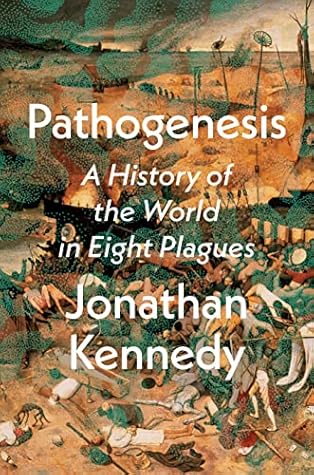More on this book
Community
Kindle Notes & Highlights
Read between
November 3 - November 5, 2024
They are so numerous that, despite their tiny size, the total mass of all bacteria on the planet is thirty-five times that of all the animals and 1,000 times the weight of all humans.[13]
Manifest Stefany liked this
Almost five decades after it was first published, William McNeill’s Plagues and Peoples (1976) remains the most well-read and important book on the impact of epidemics on society, politics and economics. But so much has changed in the intervening years that it is now necessary to take a new look at the topic. Indeed, McNeill conceded in the opening pages that “exact information is lacking wherewith to create a history of human infections.” Back then, the main evidence was eyewitness accounts of people who had lived through pandemics. These provide an invaluable insight into the past but are
...more
In the late 1990s, construction workers building a new subway stop just outside the old city gates in preparation for the millennium Olympic Games made a grim discovery that appeared to confirm Thucydides’ description. They chanced upon a mass grave that dated to the exact years of the plague, and when archeologists investigated further they noted that upper layers of corpses had been thrown in far more haphazardly than those at the bottom, pointing to “a sense of mounting panic in the city.”[6]
The differential impact of infectious diseases is a key factor in the political dynamics of the Roman Empire from the mid-second century CE until the fall of Constantinople to the Ottomans in 1453.
Ole Benedictow estimates that roughly 60 percent of the population of Europe—that is about 50 million out of 80 million people—died from the plague between 1346 and 1353.[18]
To understand the key features of the feudal system that dominated western Europe in the Middle Ages, we need look no further than G.R.R. Martin’s Song of Fire and Ice novels—or, if you prefer, HBO’s adaptation, Game of Thrones.
a song sung by enslaved Africans on Caribbean plantations: “New-come buckra, He get sik, He tak fever, He be die, He be die.”[38]
Throughout the Civil War, twice as many Northern troops died from disease as were killed in battle by Confederate guns.[87]
Steven Pinker is undoubtedly the most prominent contemporary advocate of this swaggering, triumphant narrative of history. His bestselling book Enlightenment Now: The Case for Reason, Science, Humanism, and Progress (2018) argues that, over the past few centuries, the application of science and reason has allowed us to escape the ignorance, superstition and misery of the past and create a world that is not just healthier, but also wealthier, more peaceful and increasingly respectful of human rights. Inherent in Pinker’s argument is the idea that our current economic and political system is
...more
But in the most reductive way, liberal optimists like Pinker are right when they claim that the world is getting healthier. If one looks at data from the World Bank, it’s clear that global average life expectancy has improved markedly, from about fifty years in the middle of the twentieth century to almost seventy-three today.[5]
Over the last couple of years, Covid-19 has affected all our lives to such an extent that it has become a cliché to say that the pandemic is unprecedented and extraordinary. But when we place coronavirus in its historical and scientific context, it becomes very clear that there is little about it that is new or remarkable. Recurring outbreaks of infectious disease have been a feature of human existence for millennia. Epidemics have played a critical role in, among other things, the transformation from a planet inhabited by multiple species of human to one in which Homo sapiens reigned supreme;
...more
William McNeill’s Plagues and Peoples is an epic tale in which humans inadvertently created plagues, struggled against them for thousands of years and then finally, with the help of modern medicine, won.
The great improvement in health that high-income countries experienced in the nineteenth and twentieth centuries was not a result of better medicine—as William McNeill claimed—or even economic growth per se. It was, rather, the consequence of political decisions to make massive investments in drinking water, sanitation, housing and poverty reduction.
Jonathan Kennedy teaches global public health at Queen Mary University of London. He has a PhD in sociology from the University of Cambridge.


